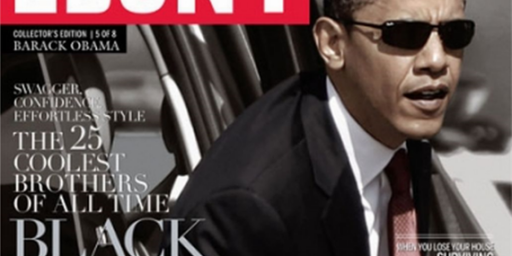Tobacco Suits Stay in State Courts
The Supreme Court yesterday denied Big Tobacco’s bid to take smoking lawsuits out of state courts.
In a major blow to tobacco companies, the US Supreme Court yesterday denied tobacco giant Philip Morris’ s request to shift all smokers’ lawsuits to federal courts, which generally give greater leeway to corporations and smaller damage awards to those claiming harm from years of exposure to tobacco smoke.
[…]
Attorneys for Philip Morris argued that, because the Federal Trade Commission is responsible for regulating the tobacco industry, federal courts should have jurisdiction over the case. The company also argued that because the US government has allowed tobacco companies such as Philip Morris to assume responsibility for tests to determine tar and nicotine levels in cigarettes, the federal court should decide the case.
The US Court of Appeals for the Eighth Circuit agreed, but the Supreme Court unanimously reversed that decision. In the opinion, Justice Stephen G. Breyer wrote that the high court found no evidence that the federal government had delegated its legal authority allowing the tobacco companies to take over testing for tar and nicotine from the US government.
I have no real sense of the merits of Philip Morris’ argument and the fact that the opinion was unanimous would seem a pretty strong indication that they were on shaky legal ground.
What strikes me as odd, however, is that Big Tobacco ought to have the presumed right to have these cases heard in the federal courts on diversity grounds. Article III, Section 2 of the Constitution provides that, “The [federal government’s] judicial Power shall extend to all Cases, in Law and Equity. . . between Citizens of different States.” Corporations have long been deemed “citizens” and have enjoyed the right to diversity status since John Marshall was Chief Justice. Theoretically, then, Philip Morris should be entitled to have disputes brought by citizens of states other than where it is incorporated heard in federal court.
Any legal scholars out there know why they aren’t?






“Major blow..” would be a bit overstated based on tobacco company stock performance. Individual cases aren’t much of a threat. With the award break-even above $6M to cover legal costs and potential wins limited to west coast juries, the trial bar has moved on to drug companies, etc.
Diversity jurisdiction has long been interpreted, although I don’t recall if this is common law, statute or the federal rules of civil procedure (or some combination), to not be present if there is a “citizen” (or maybe even “resident”) of the same state on both sides of the litigation. Thus, since these big corporations tend to be “residents” of several states (or maybe because plaintiffs can always find someone in the corporation’s state of residence that wants to sue the corporation), there is no diversity jurisdiction. The theory being, there’s no reason for a jury to favor one side over the other if their fellow residents are both plaintiffs and defendants.
What Ugh said. Plus, you can “defeat diversity” by adding a local defendant.
The common trick in Mississippi till recently was to sue a drug manufacturer in Jefferson “Lawsuit Hell” County, along with the local pharmacist, who I think was a defendant in dozens of suits …
JJ’s reading of the diversity statute wouldn’t reveal this, b/c it’s a judge-made rule — Strawbridge v. Curtis,, IIRC, a late-19th-century case that is so deeply embedded in the removal jurisdiction that it would take a statute to overturn it.
I’m guessing this is also a class action suit. There are slightly nuanced rules regarding diversity jurisdiction in class action cases, specifically with regard to the amount in controversy rules.
Under Zahn v. International Paper Co. (1973), each plaintiff must individually satisfy the amount in controversy ($75,000). If they don’t, no diversity. While several circuits have held that 28 USC 1367 abrogated Zahn, there is a circuit split as to this issue, and the Supreme Court has not yet ruled on the issue of claim aggregation for amount in controversy purposes. Furthermore, the Eighth Circuit seems to adhere to the non-aggregation viewpoint (See Trimble v. Ascaro, Inc., 232 F.3d 946, 962 (8th Cir. 2000)).
I’d guess this is why they went after federal question jurisdiction rather than diversity; they’d have to make a demonstration that each plaintiff had a case for $75,000, which I’d doubt is something they can (or want to) do.
It’s not surprising, because federal court jurisdiction is a tough subject, but with due respect, nobody commenting here yet has gotten it quite right.
Billy’s right that federal diversity jurisdiction is especially complicated in class action lawsuits. But contrary to the presumption of his comment, it wasn’t the plaintiffs who wanted to be in federal court here, it was Phillip Morris. The plaintiffs wanted to be in the state courts of Arkansas. That’s where they filed this lawsuit. Phillip Morris bumped the case to federal court — i.e., “removed” the case to federal court — but the Supreme Court has just ruled, unanimously, that their basis for doing so was bogus.
Dr. Joyner, you are exactly right in your inference that Phillip Morris’ unanimous loss means it was on shaky legal ground. But its theory for “removing” the case — from the Arkansas state courts to the federal district court situated in Arkansas — was that this was essentially a suit against the federal government, and specifically the Federal Trade Commission, based on the FTC’s pervasive regulation of cigarette company advertising practices. The Supremes said, no, uh-uh, it really is a suit against Phillip Morris, and the fact that the FTC regulates Phillip Morris doesn’t mean that this was a lawsuit against “any officer (or any person acting under that officer)of the United States or of any agency thereof” within the meaning of 28 U.S.C. § 1442(a)(1). (That’s the section of Title 28 of the U.S. Code that lets the federal government remove (i.e, bump over to federal court) any lawsuits filed against it in state court.)
This case therefore didn’t involve diversity jurisdiction at all — either as an initial justification for filing the case in federal court (because it wasn’t filed there) or as a basis for removing it to federal court.
But that still leaves Dr. Joyner’s question: Why couldn’t Phillip Morris just have removed the case to federal court based on diversity jurisdiction?
Ugh and Anderson are sort of right on that, mostly. Ugh seems to have confused personal and subject-matter jurisdiction. Companies that sell products nationwide may indeed be subject to personal jurisdiction in every state of the United States. But that doesn’t depend on whether or not those companies are incorporated there.
A corporation is indeed a “person” for purposes of diversity jurisdiction, and by statute (28 U.S.C. § 1332(c)), it is considered a “citizen” of both the state in which they are incorporated and the state in which they have their principal place of business. Phillip Morris is neither headquartered in Arkansas nor incorporated there, but it does do business in Arkansas and it is subject to being sued there. So it is probably a good example of the classic “diverse defendant” who might have grounds to be especially worried about getting a fair shake in the Arkansas state-court system. If a single Arkansas citizen had sued Phillip Morris in the Arkansas state courts for violation of this same state consumer protection statute, Phillip Morris could indeed have removed the case to the federal district court located in Arkansas under the general diversity statute, 28 U.S.C. § 1332(b), and under the diversity removal statute, 28 U.S.C. § 1441(b).
However, as Anderson correctly notes, Phillip Morris would lose that ability if the plaintiffs had also added another defendant to the suit who is a citizen of Arkansas. Section 1441(b) says that a diversity case “shall be removable only if none of the parties in interest properly joined and served as defendants is a citizen of the State in which such action is brought.” (The theory is that if you have at least one local-state guy being sued, that mitigates the likely unfairness for all of the defendants.) For that reason, it’s very common for canny plaintiffs’ lawyers to add an addition, “non-diverse defendant” — one who’s not a target, and whose involvement may be very peripheral indeed, but who will prevent the main defendant(s) from removing.
As best I can tell, however, that’s not what happened here. The sole defendant appears to have been Phillip Morris.
Instead, the reason why Phillip Morris probably couldn’t remove based on diversity of citizenship was indeed, as Billy suggested, probably because the case was brought as a class action. It may have been that there were “amount in controversy” issues, or it may have been that there was a lack of complete diversity — i.e., that someone in the putative class of plaintiffs was a citizen of the same state where Phillip Morris was incorporated or had its principal place of business.
That sort of gamesmanship, however, was directly addressed by the Class Action Fairness Act of 2005. Were this same case filed today, that act almost certainly would permit Phillip Morris to remove from the Arkansas state courts to the federal district court located in Arkansas. The effective date of the Act was after this lawsuit was already filed. But that Act is strong enough that it probably means your headline for this post won’t be accurate for purposes of future cases.
Patterico tells me that when I write so much, or with so many links, that my comment runs afoul of his comment filter, I ought to just post it on my own blog instead. He’s right. And that’s what’s happened with a long comment I just left that, I presume, you’ll screen and perhaps release in due time, Dr. Joyner.
Short version: A lot of the previous comments are sorta right but sorta wrong. This case had nothing to do with diversity jurisdiction; Phillip Morris was trying to contort another (very weak) basis for federal removal jurisdiction to help it bump this case into federal court. When the case was filed, because it was a class action, Phillip Morris couldn’t instead use diversity of citizenship to remove it from state to federal court. Now, however, it almost certainly could, due to the Class Action Fairness Act of 2005 (which only became effective after this suit was already on file).
Released!
But, yeah, probably good advice. Not that I don’t appreciate the discussion here — I do — but it’s probably a more effective way of building your own blog up.
Generally, if my comment on someone else’s post goes into a second paragraph, I stop typing and make a post out of it here and then send a trackback.
Fantastic clarification, Beldar. I must confess I’m rusty on removal.
I’m definitely going to check out your blog now.